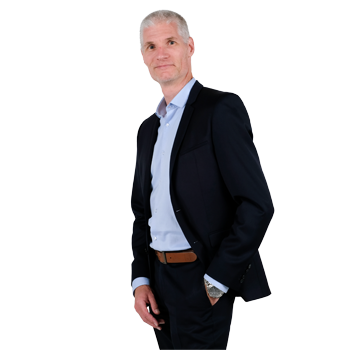In the new economy, the process of innovation has changed completely. Companies no longer wait until their new product or service has been fully developed in every detail. Nowadays, they begin with a ‘minimal viable product’ that is then improved through user feedback. Nor is fact-based innovation the reserve of large companies. It is at start-ups and fast-growing, innovative companies in particular that the data component plays an increasingly important role.
"Using mathematics and algorithms, CQM can help any business innovate," argues managing partner, Arjen Vestjens. "And it’s a highly stimulating process. With the proper quantitative support, a small idea can quickly grow into a large and successful business model.”
Vestjens believes this new, dynamic economy fits perfectly with the innovation philosophy at CQM, which consists of four steps: “Start small: don’t think up everything in advance, but instead start with one department or one aspect of your idea. Experiment: what do you want to know? Be inquisitive: do you want to find the answer come what may? Mathematical techniques help enormously to unearth that information. And be persistent: in the end you’ll be rewarded and come up with new ideas that have a real impact”.
An essential part of this four-step approach is the 'feedback loop': information that you get back from the first users, from which you can learn. This is just one of the mathematical tools that CQM has developed to help achieve innovations quickly and reliably.
Reviews and ratings
With the new economy, the process of innovating has become broader and thus far more challenging. “In the past, our innovation support mainly took place during the R&D phase: how do you design a product that’s easy to manufacture?” explains Vestjens. “But now innovation is shifting more towards marketing and the individualised needs of the customer: develop a product or service that the market wants.” To assist this process CQM has, for example, developed a reviews-and-ratings service. "We use this to collect from the internet the opinions of users of the product and competitors’ products, and then run a sentiment analysis. We determine the appropriate test points and analyse the influence of each test point on how users rate the product or service."
Data analytics
Another striking difference is that while previously companies only relied on people’s opinions, they now also use algorithms. “Start-ups and fast-growing innovators trust fact-based information, allowing them to respond to developments more quickly and more effectively. This means decisions about improvements are based not on feelings but facts. The result: faster innovation and a more successful product."
By making the entire process data-driven, you can not only see what has occurred (descriptive analytics), but also predict what will happen (predictive analytics), as well as the best that can happen as a result of optimization (prescriptive analytics). "And this is precisely what CQM is good at. By mathematical analysis of data, we create new insights and better innovations. The mindset of innovators like these really appeals to us. And we carry that vibe, along with our innovation philosophy, with us to other companies. What often starts as a no-obligations sparring partner role evolves into a long-term collaboration. Working together with the idea’s initiator, we develop a formula for its success!
CQM is involved with several innovative start-ups and young, fast-growing companies.
DashTag
 DashTag wants to increase the enjoyment of amateur footballers by adding an extra element. Every player wears the Dash, a small sensor that measures data such as speed and distance covered. You can then track your own progress using an app, and compare and share via social media. "We're currently in the beta programme phase,” says Dirk van den Berg, co-founder of DashTag, “and there's been a lot of interest from teams across the country". CQM is helping with this initiative based on its own interest and expertise in the field of sports analytics.
DashTag wants to increase the enjoyment of amateur footballers by adding an extra element. Every player wears the Dash, a small sensor that measures data such as speed and distance covered. You can then track your own progress using an app, and compare and share via social media. "We're currently in the beta programme phase,” says Dirk van den Berg, co-founder of DashTag, “and there's been a lot of interest from teams across the country". CQM is helping with this initiative based on its own interest and expertise in the field of sports analytics.
Shapeways
Shapeways is a fast-growing start-up in 3D print products, which prints orders from around the world in its offices in Eindhoven and New York. "To increase capacity, we want to consolidate multiple 3D models into one print job,” explains Jules Witte, Manager of Manufacturing EU at Shapeways. “CQM developed the smart mathematical algorithms to determine the optimal combination of models.”
Ampelmann
 To ensure the safe transportation of personnel and equipment between ship and offshore platform, Ampelmann develops walkways and elevators for at sea, as a safe and cost effective alternative to transport by helicopter. "CQM is helping us as a partner to realize the growth ambitions of our young company," explains Thomas van den Born, Strategic Project Manager. "Progress with our first collaboration, the Operator Planning project, where CQM is using AIMMS to develop a planning support system, has been very encouraging."
To ensure the safe transportation of personnel and equipment between ship and offshore platform, Ampelmann develops walkways and elevators for at sea, as a safe and cost effective alternative to transport by helicopter. "CQM is helping us as a partner to realize the growth ambitions of our young company," explains Thomas van den Born, Strategic Project Manager. "Progress with our first collaboration, the Operator Planning project, where CQM is using AIMMS to develop a planning support system, has been very encouraging."
Deliveroo
Deliveroo is an internet start-up meals delivery service for local top restaurants who don’t have their own delivery service, where customers can place their order via an app or website. CQM developed a simulation model to optimize the allocation of orders to cycle couriers.
You can find more case studies at www.cqm.nl/innovaties.


